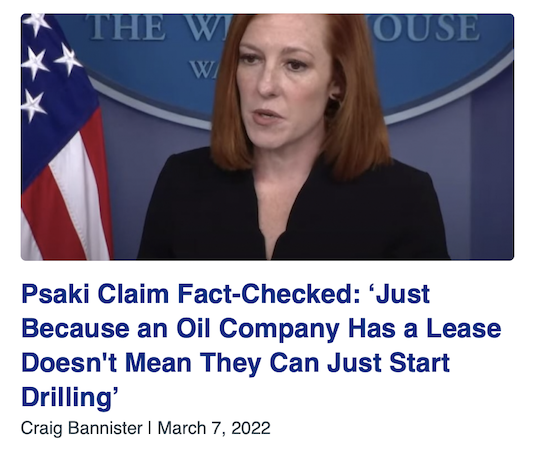CNSNews.com’s parent, the Media Research Center, has taken money from fossil fuel interests in the past, so it’s no surprise that it would rely on the industry to rebut Biden administration claims about oil and gas leases on federal land. Melane Arter seemed annoyed in a March 4 article:
President Biden called for fighting inflation by making more goods in the United States in his State of the Union address on Tuesday, but the Biden administration doesn’t hold the same view when it comes to rising gas prices.
Fox News White House Correspondent Jacqui Heinrich asked Thursday, “On gas, you just said that, you know, ‘less supply raises prices,’ it’s not in our strategic interest to reduce the supply. We also know, you know, the President, as recently as yesterday, talked about increasing domestic manufacturing to bring down prices on inflated items like goods. So why not apply the same logic to energy and increase domestic production here?”
“Well, there are 9,000 approved oil leases that the oil companies are not tapping into currently. So I would ask them that question,” White House Press Secretary Jen Psaki said.
Three days later, Craig Bannister cranked up the spin machine to try and shut down the claim:
In an effort to distract from President Joe Biden’s anti-domestic energy policies, White House Press Secretary Jen Psaki insinuated last Thursday that, because there are nine thousand unused, approved oil leases in the U.S., American oil companies are simply refusing to begin producing domestic oil from them.
[…]Despite Psaki’s insinuation, oil companies can’t simply start using approved oil leases to begin pumping, the fact check explains, noting that it could take up to 10 years of overcoming regulatory hurdles and years of drilling before the oil well of an “approved” lease becomes fruitful:
Bannister went on to quote the right-wing website the National File as evidence.
He followed up for a March 8 article by going straight to the oil industry’s lobbying group:
On Monday, White House Press Secretary Jen Psaki repeated last week’s insinuation that, because there are approved oil leases going unused, the oil industry is refusing to increase U.S. production – but, the American Petroleum Institute (API) says that’s a red herring designed to distract from the Biden Administration’s anti-domestic energy policies.
Last Thursday, and again on Monday, Psaki told reporters to ask oil companies why they’re not using nine thousand approved oil drilling permits – a question API’s Kevin O’Scannlain answers in “The Red Herring of Unused Leases,” a blog on the organization’s website.
Oil companies have financial incentive to produce oil on leased federal lands, because they have to pay “rent” and are at risk of losing their leases until they begin producing, O’Scannlain explains:
[…]Plus, it’s not as quick and easy as merely flipping a switch, since it takes years of work to determine whether the leased land even holds enough oil to be commercially viable, O’Scannlain writes.
Then, there’s the long process of overcoming “administrative and legal challenges at every step along the way The lengthy process to develop them from a lease often is extended by administrative and legal challenges at every step along the way.”
“The argument about ‘unused’ leases is a red herring, a smokescreen for energy policies that have had a hamstringing effect,” on oil production, O’Scannlain says.
But Neither Bannister nor O’Scannlain explained where, exactly, in the regulatory process all those 9,000 leases are and when they can be put online.
Bannister mislead his readers by hyping that the Biden administration suspended the issuance of new leases when Biden took office but not reporting that the moratorium has since been lifted, and the Biden administration has issued more drilling permits on federal lands than Trump did. Bannister also misleadingly claimed:
The Biden Administration isn’t just refusing to grant additional leases – it has actually revoked a permit that could bring 830,000 barrels of crude oil daily to the U.S.
In a controversial move during his first day in office, Pres. Biden revoked the permit allowing extension of the Keystone XL pipeline to Alberta, Canada. If completed, the pipeline could potentially provide the U.S. with more oil than it currently buys from Russia.
In fact, most of the products from Keystone XL oil would likely have been exported. But when you put serving talking points ahead of reporting facts, these kind of things happen.
Bannister went to industry lobbyists again for a March 22 article:
“How do you know what motivates company business decisions?” a coalition of 10 oil and natural gas trade associations asked President Joe Biden after Biden claimed that companies were refusing to pump more oil, in order to increase their profits.
Last Friday, the coalition sent a letter to Biden, urging him to stop falsely blaming oil and natural gas companies for not producing more due to greed when, in fact, it is his administration’s anti-energy policies that are responsible.
The letter seeks to address “repeated distortions and half-truths that have been expressed by White House officials” and to “set the record straight and provide a bit of context on statements that have been made regarding energy production,” the coalition writes.
Actually, the Dallas Federal Reserve office recently surveyed 139 oil and gas companies about trends in the industry, and one of the questions asked, “Which of the following is the primary reason that publicly traded oil producers are restraining growth despite high oil prices?” Nearly 60 percent responded, “Investor pressure to maintain capital discipline”– i.e., investors want prices high so they can make money.Less than 10 percent cietd “government regulations” as the reason.
Instead of noting that, Bannister let the lobbyists complain that “Language and facts matter.” Of course, if they mattered, Bannister would have reported the full truth instead of being a stenographer for industry lobbyists.
